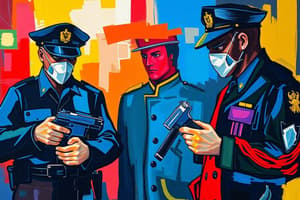Podcast
Questions and Answers
Which phase of a criminal investigation involves skillful questioning of witnesses and suspects?
Which phase of a criminal investigation involves skillful questioning of witnesses and suspects?
- Phase I
- Phase II
- Phase III
- None of the above (correct)
What is one of the tools used by investigators in criminal investigations?
What is one of the tools used by investigators in criminal investigations?
- Interrogation under duress
- Public trial
- Social media analysis
- Forensic evidence collection (correct)
What is NOT a method to identify a suspect in Phase I of a criminal investigation?
What is NOT a method to identify a suspect in Phase I of a criminal investigation?
- Eyewitness testimony
- Confession
- Fingerprint analysis (correct)
- Circumstantial evidence
In Phase III of a criminal investigation, what is the primary aim when gathering evidence?
In Phase III of a criminal investigation, what is the primary aim when gathering evidence?
Which type of data is NOT typically gathered by investigators?
Which type of data is NOT typically gathered by investigators?
What is an important aspect of the Instrumentation tool used in criminal investigations?
What is an important aspect of the Instrumentation tool used in criminal investigations?
What is NOT listed as part of the Equipment of the Investigator according to the text?
What is NOT listed as part of the Equipment of the Investigator according to the text?
What is one of the duties of the First Responder according to the text?
What is one of the duties of the First Responder according to the text?
What is the main purpose of cordoning off the crime scene according to the text?
What is the main purpose of cordoning off the crime scene according to the text?
Which document is mentioned in Protocol 4: Duties of the First Responder according to the text?
Which document is mentioned in Protocol 4: Duties of the First Responder according to the text?
What is one of the tasks related to witnesses assigned to the First Responder according to the text?
What is one of the tasks related to witnesses assigned to the First Responder according to the text?
In what section of CRIMINAL INVESTIGATION COURSE (CIC) do we find information about Organization and Equipment of the Investigation Team?
In what section of CRIMINAL INVESTIGATION COURSE (CIC) do we find information about Organization and Equipment of the Investigation Team?
What intellectual characteristics must an effective investigator possess?
What intellectual characteristics must an effective investigator possess?
Which of the following is NOT listed as a psychological characteristic of an effective investigator?
Which of the following is NOT listed as a psychological characteristic of an effective investigator?
What is the primary responsibility of an investigator pertaining to a crime scene?
What is the primary responsibility of an investigator pertaining to a crime scene?
Which of the following is a physical characteristic of an effective investigator?
Which of the following is a physical characteristic of an effective investigator?
What should an investigator do when there is an injured person at the scene?
What should an investigator do when there is an injured person at the scene?
What is the main purpose of securing a crime scene?
What is the main purpose of securing a crime scene?
Flashcards are hidden until you start studying
Study Notes
Characteristics of an Effective Investigator
- An effective investigator must possess intellectual characteristics, including knowledge of the elements of crime and the ability to apply investigative techniques and work with people.
- Psychological characteristics of an effective investigator include being emotionally well-balanced, detached, inquisitive, suspecting, discerning, self-disciplined, and persevering.
- Physical characteristics of an effective investigator include being physically fit, having good vision, and good hearing.
Functions of the Investigator
- Provide emergency assistance, including arranging for medical attention, identification, and removal of injured persons.
- Secure the crime scene, ensuring its protection by using other police officers or responsible persons to keep witnesses, suspects, and victims from disturbing the scene.
Tools of an Investigator
- Interviewing involves skillful questioning of witnesses and suspects.
- Instrumentation involves the scientific examination of real evidence and the application of instruments and methods of the physical sciences in detecting crime.
Phases of Investigation
- Phase I: Identify the suspect/s through confession, eyewitness testimony, circumstantial evidence, and associate evidence.
- Phase II: Locate and apprehend suspect/s through surveillance, undercover assignments, and informants.
- Phase III: Gather and provide evidence to establish the guilt of the accused, including establishing the fact of the existence of the crime.
Equipment of the Investigator
- An investigator's tickler contains important documents, including an investigator's checklist, anatomical diagram form, evidence checklist, and turn-over receipt.
Protocols in Investigation
- Protocol 3: Investigation Team - Organization and Equipment
- Protocol 4: Duties of the First Responder
- Proceed to the crime scene to validate the information received.
- Record the exact time of arrival and all pertinent data regarding the incident in the issued pocket notebook.
- Cordon off the crime scene area with police lines or other materials to preserve its integrity.
- Check whether the situation still poses imminent danger and call for backup if necessary.
- Identify possible witnesses and conduct a preliminary interview to ensure their availability for the incoming investigator-on-case.
Studying That Suits You
Use AI to generate personalized quizzes and flashcards to suit your learning preferences.




